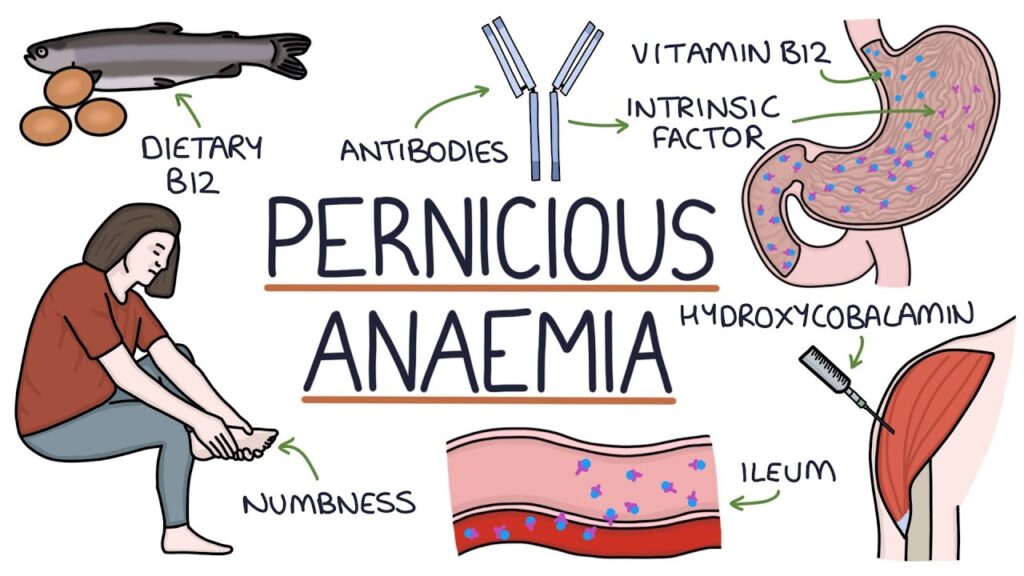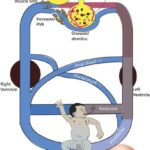Pernicious anemia is a form of megaloblastic anemia resulting from vitamin B12 deficiency due to impaired absorption in the gastrointestinal tract. It is classified as an autoimmune condition in which the body fails to produce intrinsic factor, a protein essential for vitamin B12 absorption in the ileum. Left untreated, pernicious anemia can lead to irreversible neurological complications and systemic damage.

Understanding Pernicious Anemia: A Deficiency Rooted in Malabsorption
Pernicious anemia is distinct from general B12 deficiency caused by dietary insufficiency. In this disorder, the immune system attacks gastric parietal cells or intrinsic factor itself, both critical for B12 absorption. Without sufficient B12, the body cannot produce adequate red blood cells or maintain proper neurological function.
Key Causes of Pernicious Anemia
1. Autoimmune Destruction of Parietal Cells
- The immune system produces antibodies that destroy stomach lining cells.
- Loss of these cells results in diminished production of intrinsic factor.
2. Intrinsic Factor Antibodies
- Autoantibodies target intrinsic factor directly, inhibiting its ability to bind vitamin B12.
3. Genetic Predisposition
- Common in individuals with Northern European descent or a family history of autoimmune conditions such as type 1 diabetes and vitiligo.
4. Associated Conditions
- Atrophic gastritis
- Thyroid disorders
- Type 1 diabetes
- Addison’s disease
Pernicious Anemia Symptoms: Recognizing the Clinical Manifestations
Early diagnosis can be challenging due to the subtle onset of symptoms. As the deficiency progresses, clinical signs become more evident.
- General symptoms:
- Fatigue
- Pallor
- Shortness of breath
- Dizziness
- Heart palpitations
- Gastrointestinal symptoms:
- Loss of appetite
- Weight loss
- Glossitis (inflamed tongue)
- Nausea or diarrhea
- Neurological symptoms:
- Numbness or tingling in extremities
- Difficulty walking
- Memory loss
- Depression or mood changes
- Cognitive impairment
Diagnostic Approach for Pernicious Anemia
1. Complete Blood Count (CBC)
- Macrocytic anemia with elevated mean corpuscular volume (MCV)
- Low hemoglobin and hematocrit levels
2. Vitamin B12 Serum Levels
- Significantly reduced B12 levels (<200 pg/mL)
3. Intrinsic Factor Antibody Test
- Positive in up to 70% of patients
4. Parietal Cell Antibody Test
- Found in nearly 90% of cases, though less specific
5. Methylmalonic Acid (MMA) and Homocysteine Levels
- Elevated in B12 deficiency, helpful in early diagnosis
6. Schilling Test (historical)
- Previously used to assess B12 absorption; now largely obsolete due to modern antibody testing
Effective Treatment of Pernicious Anemia
Treatment aims to restore B12 levels, reverse anemia, and prevent neurological complications.
1. Vitamin B12 Replacement Therapy
- Intramuscular Cyanocobalamin or Hydroxocobalamin:
- Initial loading dose followed by maintenance injections for life
- Oral B12 Supplements:
- Effective in some cases with very high doses
2. Monitoring and Follow-Up
- Regular CBC and B12 levels
- Monitoring for neurological improvement
- Lifelong supplementation required
3. Dietary Considerations
- Although diet cannot correct the malabsorption, patients should maintain a B12-rich diet including:
- Meat
- Eggs
- Dairy
- Fortified cereals
Long-Term Outlook and Potential Complications
If left untreated, pernicious anemia can result in:
- Irreversible neurological damage
- Increased risk of gastric cancer
- Infertility
- Heart problems due to chronic anemia
- Depression and psychiatric disorders
Timely diagnosis and continuous treatment significantly improve prognosis.
Prevention and Risk Reduction
Although autoimmune origin cannot be prevented, early screening in at-risk individuals may help avoid complications. Recommended actions include:
- Screening individuals with autoimmune diseases
- Monitoring elderly patients and vegetarians for early B12 deficiency
- Educating patients on the necessity of lifelong treatment
Frequently Asked Questions:
What distinguishes pernicious anemia from other types of anemia?
Pernicious anemia is specifically caused by impaired absorption of vitamin B12 due to lack of intrinsic factor, unlike iron-deficiency anemia or folate-deficiency anemia.
Can pernicious anemia be cured?
It cannot be cured, but with lifelong B12 supplementation, patients can live normal, healthy lives.
Is pernicious anemia genetic?
There is a genetic predisposition, especially in those with a family history of autoimmune diseases.
Can diet alone treat pernicious anemia?
No. Since the issue lies with absorption, dietary intake alone is insufficient. Parenteral or high-dose oral B12 is required.
How quickly do symptoms improve after starting treatment?
Hematologic symptoms typically improve within weeks, but neurological symptoms may take months and may not fully reverse if long-standing.
Pernicious anemia is a serious yet manageable autoimmune condition resulting in vitamin B12 deficiency. Accurate diagnosis, appropriate treatment, and continuous management are crucial for preventing irreversible complications. Awareness of its signs, risk factors, and lifelong treatment requirements can ensure optimal patient outcomes and quality of life.

